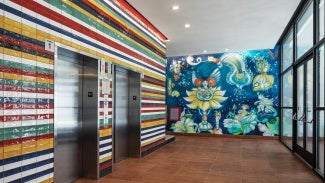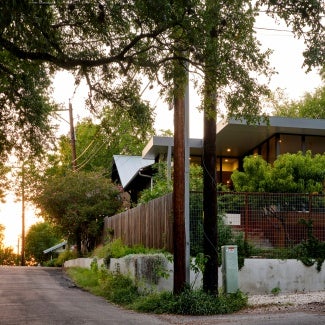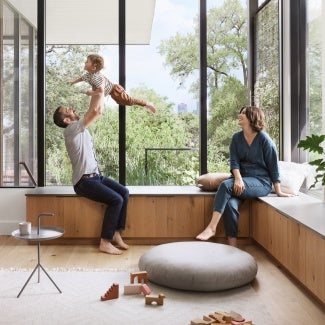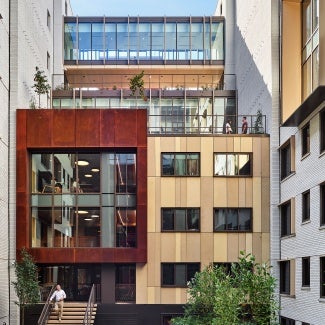Housing Award
Recognizes the best in home design—showcasing how beauty, safety, sustainability, and comfort can come together.

The 2026 submission period for this award is now closed, with public announcement of the next recipient anticipated in June 2026. Until then, join us in recognizing architectural excellence among the recent recipients of this and other prestigious AIA national awards.
Recognizing the best in home design
It’s a life necessity, a sanctuary for the human spirit, and many people’s first and most personal encounter with architecture: The home. By recognizing the best in home design, the AIA Housing Award shows the world how beauty, safety, sustainability, and comfort can come together.
Questions? Email AIA Awards
Entrants
- All entries must identify an AIA Architect member in good standing (e.g. current on dues, no ethical violations) that is licensed to practice in the U.S. affiliated with the project to serve as the project Submitting Architect.
- Submitting architects do not have to be the head of the team.
- Projects must credit every substantial contributor.
- Owners, individual practitioners, private design firms, public agencies, civic organizations, and public interest groups can submit projects or programs in which they were involved.
Projects
- New construction, renovations, and restorations are eligible.
- Projects may be located anywhere in the world but must have been designed by a U.S.-licensed architect.
- Projects must be relevant to a current category(s).
- Projects, if completed, must have been completed after January 1, 2020.
Fee
All entry fees are non-refundable. Entry includes a $450 fee for a single project submission to a single project-based award program, and $100 for additional submissions of the same project to any other project-based award programs.
2026 Deadline
Submissions are due by 5pm ET on Thursday, November 13, 2025. All materials must be submitted via the online application portal (i.e., cannot be accepted via email, phone, shared online drive, fax, post, etc.) by the prescribed deadline(s): deadline extension or exception requests will not be granted. Applicants and interested parties are encouraged to seek award assistance well in advance of application deadlines to minimize the risk for ineligibility and/or application noncompliance, rendering the entry removed from review.
Formatting requirements
For information on templates for required uploaded forms (e.g., Image Release Form, Application Release Form, Client Authorization, etc.), please visit the AIA Awards FAQ webpage.
Applications that do not conform to the program's formatting requirements for uploaded materials (e.g., required forms, images, and portfolio documents) are subject to automatic disqualification. AIA does not accept release forms with altered terms.
Application components
The AIA online application portal houses extensive information on the materials required to submit an application. Please refer to this portal when the program receives materials for the 2026 season.
Project categories
- Community-engaged design: Projects (built and unbuilt) that focus on excellence in a community-engaged design process as much as the resulting design of physical structures. Submissions in this category do not need to include housing.
- Excellence in affordable housing: Design responses to the needs and constraints of affordable housing at a variety of scales.
- Mixed-use community connection: Housing with other community amenities for the purposes of neighborhood transformation, meeting resident needs and/or supporting community objectives such as transit-oriented development.
- Multifamily housing: Multifamily housing design, both high- and low-density projects for public and private clients and mixed-use projects.
- One- and two-family custom residences: Custom and remodeled homes for specific client(s).
- One- and two-family production homes: Homes built for the speculative market.
- Specialized housing: Housing that meets the unique needs of other specialized housing types such as single-room occupancy residences (SROs), independent living for the disabled, residential rehabilitation programs, domestic violence shelters, residential halls/student housing, and other special housing.
- Universal dwelling design: Projects that demonstrate excellence in universal design principles, affordability, innovative technology, and human-centered integrative approaches to community inclusion.
Review process
- AIA Awards juries will be shared on AIA.org once available.
- Award advisory panels are composed of individual experts recommended to and appointed by the AIA President, to adhere to composition requirements outlined in the AIA Rules of the Board.
- All policy and application compliant entries are evaluated by a uniform rubric.
- Jurors review submissions independently, then convene collectively to discuss submissions and select recipients.
- Contact from award applicants and/or their supporters (e.g., nominator, letter of reference writer, mentor, mentee, employer, etc.) to the real or potential jurors presiding over the review of an AIA award program is strictly prohibited.
- Evidence of current or future applicants and/or their supporters attempting or actualizing contact with an AIA award juror(s) pertaining to the evaluation of applications to specific award programs within specific award cycles can result in an official filing with the AIA Ethics Committee, suspension of membership in good standing, ineligibility of involved parties from participation in current and/or future AIA award program participation, and/or additional measures.
Review criteria
- The jury evaluates entries based on how successfully projects have met their individual requirements.
- All projects must demonstrate design achievement, including a sense of place and purpose, ecology and environmental sustainability, and history.
- In 2019, AIA adopted the Framework for Design Excellence as the set of guidelines and requirements to assess project performance. Climate action requires a holistic approach addressing the interdependence among people, buildings, infrastructure, and the environment. The Framework for Design Excellence provides the elements that support this vision during project evaluation. While projects submitted do not need to address all the measures included in the framework, they do need to highlight how they perform in this context and highlight relevant narratives and metrics when applicable.
- Three framework principles in particular will be assessed across submissions: Equity (How does the project support social impact goals and contribute to community context and history), Resilience (To what extent does the project plan for climate and community change; How do environmental performance measures contribute to long-term sustainability), and Innovation + Delight (To what extent does the project model leadership in the field and enhance our understanding of residential architecture and/or community development).
Recognition
Recognition for this program typically includes the following elements but may be subject to change. Recipients will receive additional information about this cycle’s recognition benefits with their selection notification.
- Promotional recognition in AIA communication channels.
- Invitation for the recipient or a recipient representative to attend selected awards event celebrations, commonly held during the annual AIA Conference on Architecture & Design®.



